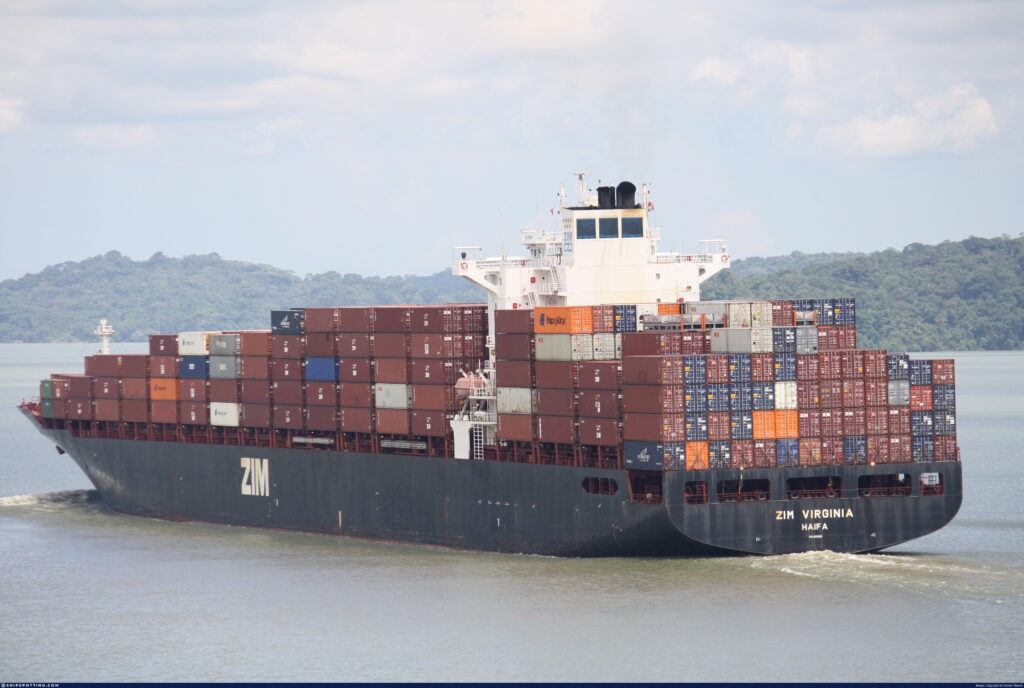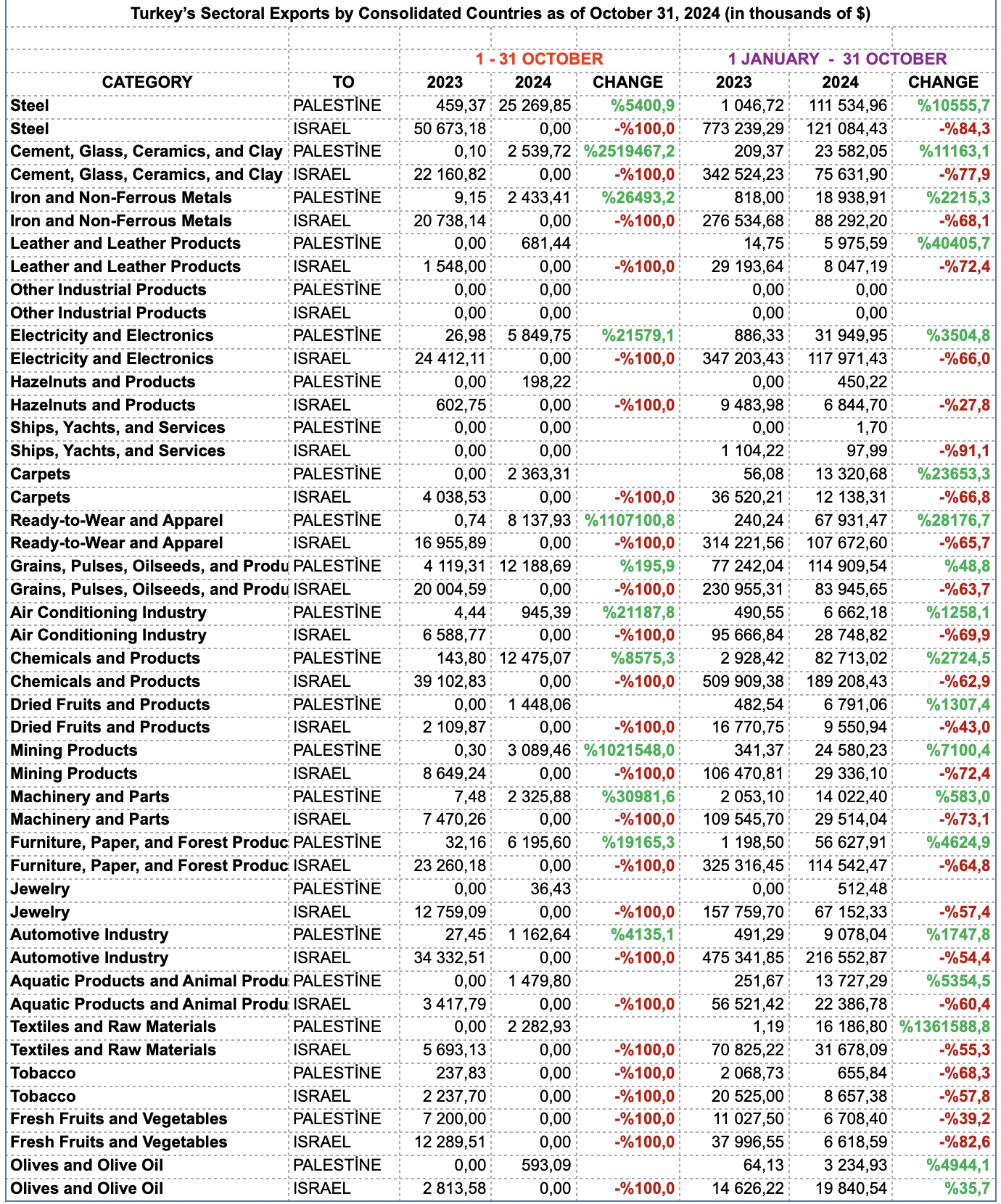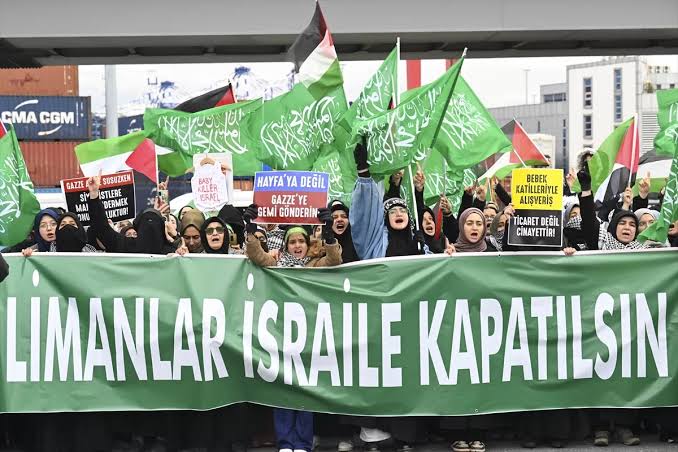Levent Kenez/Stockholm
Turkish President Recep Tayyip Erdogan often emphasizes that Turkey is the only country enforcing a trade embargo against Israel. Trade Minister Ömer Bolat has echoed this stance, asserting that all exports to Israel have ceased at Turkey’s customs. Critics argue that trade with Israel is simply being rerouted through Palestine and other third countries, circumventing the embargo. Since Turkey’s trade embargo on Israel began in April, trade volume with Palestine has surged dramatically, adding fuel to the skepticism surrounding the government’s narrative. This trend, many suggest, may serve as evidence that Turkey’s trade with Israel persists despite the official restrictions.
Following public criticism in response to protests against Israel, the Erdogan government was compelled to adopt a tougher stance on the country. Ankara announced on April 9 that it would impose trade restrictions on Israel in response to the conflict in Gaza.
“The decision will remain in effect until Israel declares an immediate ceasefire and allows a sufficient and uninterrupted flow of humanitarian aid into Gaza,” the Turkish Ministry of Trade announced. Attached to the announcement was a list of 54 products subject to export restrictions. However, experts expressed skepticism about the government’s decision due to the absence of customs tariff codes in the published list. According to reports in the Turkish media, it has also been alleged that trade with Israel will continue through third countries.
However, at the outset, few anticipated that one of these “third countries” would be Palestine. This is largely because Israel’s stringent controls over goods entering Palestine typically limit the volume of imports significantly. Furthermore, given the ongoing conflict and financial hardships within Palestine, an increase in purchasing power for Palestinian businesses was not expected.
The World Bank’s latest report reveals a dire situation for the Palestinian economy, noting a financing gap of $682 million for the Palestinian Authority, expected to reach $1.2 billion soon. Since October 2023, nearly half a million jobs have been lost, with the overall poverty rate climbing to 32.8 percent, and soaring to 64 percent in Gaza. Palestinian Economy Minister Muhammad El-Amour stated on May 26 that production in the Gaza Strip had completely ceased due to the Israeli occupation, while it had partially stopped in the West Bank. According to El-Amour, the Palestinian economy has lost approximately $20 million daily due to the occupation.

However, according to the foreign trade data released by the Turkish Exporters Assembly (TİM) on November 2, Turkish trade with Palestine increased by 672 percent in October compared to the previous year, reaching a total of $95,406,250. Among the products that saw increased exports are jewelry, carpets and leather goods.
According to the export data from TİM for October, exports between Turkey and Palestine increased from $12,358,410 in October 2023 to $95,406,250 in October 2024, reflecting a remarkable 672 percent rise. Year-to-date exports have also surged, rising by 542.5 percent from $102,920,870 to $661,248,260.
Steel exports to Palestine continued to soar, increasing from $459,370 in October 2023 to $25,269,850 in October 2024, marking a staggering 5,400 percent growth. In contrast, steel exports to Israel were valued at $50,289,000 in October 2023.

The export of cement, glass, and ceramics and clay products, which was only $10,000 in October 2023, surged to $2,539,720 the following year, reflecting a year-on-year increase of 2,519,467 percent. Similarly, exports of iron and non-ferrous metals rose from $9,150 in October 2023 to $2,433,410, an increase of 26,493 percent. The export of electrical and electronic goods also saw a significant rise, growing by 21,579 percent from $26,980 in October 2023 to $5,849,750 in October 2024. Exports to Israel in this category were valued at $24.4 million in October 2023.
The export of chemical products and goods saw an annual increase of 8,575 percent, with October 2023 exports at $143,800, compared to $12,475,070 in October 2024. Exports of mining products also experienced a significant increase, rising from only $300 in October 2023 to $3,089,460 in the following year, representing a growth rate of 1,021,548 percent.
Exports of machinery and parts increased from $7,480 in October 2023 to $2,325,880 in October 2024, reflecting growth of 30,981 percent. In October 2023, $7.5 million worth of machinery and parts were exported to Israel. The automotive industry was also among the sectors exporting to Palestine, with exports increasing from $27,450 in October 2023 to $1,162,640, reflecting growth of 4,135.1 percent.
Notably, some products that had not been exported in 2023 were newly reflected in export data released for October 2024. The most remarkable was jewelry; Turkey reportedly sold $36,430 worth of jewelry to Palestine, despite the ongoing humanitarian crisis.

On November 2, Turkish police intervened against protesters attempting to block containers allegedly carrying goods to Israel on the Ambarlı Port Road in Istanbul. Pro-government media claim that the protesters are agents of Israeli influence and that the demonstrations were organized due to discomfort caused by the Erdogan government’s policy toward Israel. They also allege that some of the demonstrators were supported by Iran. During the protests, Trade Minister Bolat reiterated in a message he posted on X that the goods were only going to Palestine and that they were acting in coordination with the Palestinian authorities.












